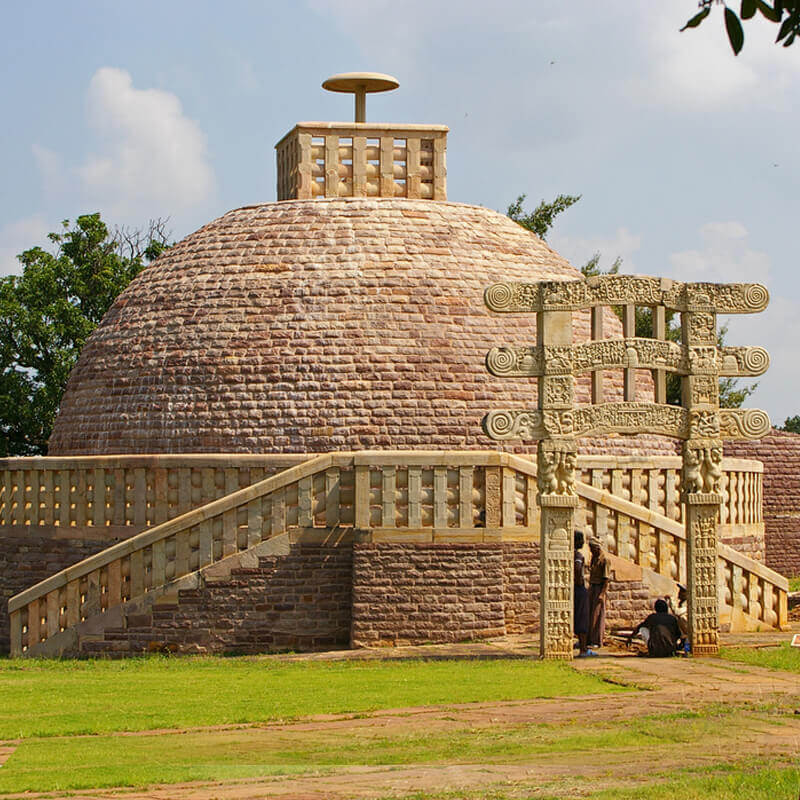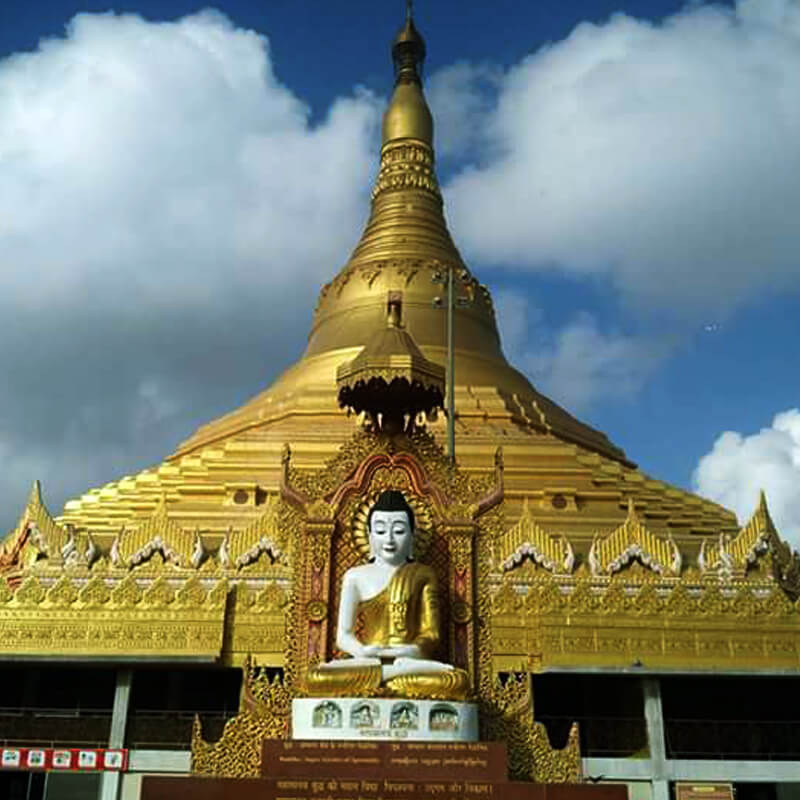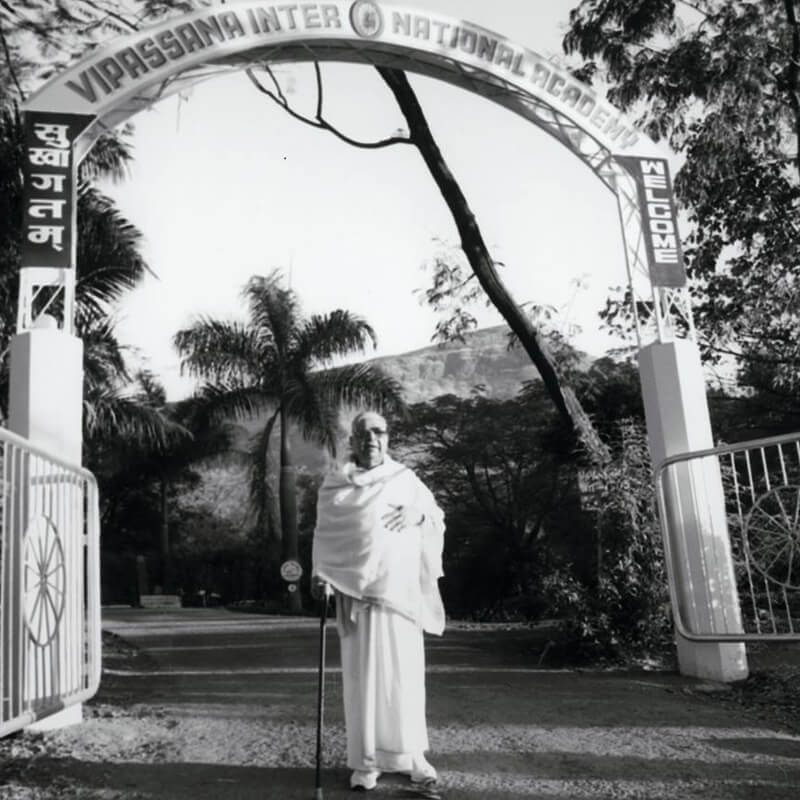July 17: Goenkaji visited a property that was offered as a donation to start a Vipassana center in Chicago.
Goenkaji says, "The establishment of centers marks a new stage in the spread of Vipassana. It is important to understand their significance. Centers for Vipassana meditation are not clubs designed for the enjoyment of their members. They are not temples in which to perform religious ceremonies. They are not places for socializing or entertainment. They are not communes where members of a sect can live in isolation from the outside world, according to their own particular rules. Instead, centers are schools, which teach one subject: Dhamma, the art of living. All who come to these centers, whether to meditate or to serve, come to receive this teaching. They must, therefore, be receptive in their attitude, trying not to impose their ideas, but rather, to understand and to apply the Dhamma that is offered."
After inspecting the property, Goenkaji left for Madison, Wisconsin. The title of his evening talk at the Fluno Center at the University of Wisconsin was "Benefits of Vipassana for Leaders and Society." Goenkaji spoke to a select audience that included professors, scientists, doctors, accountants, businesspeople and nuns.
Some very old students of Goenkaji who had taken courses with him 25-30 years ago came to see him. Later on, he again met the Chicago trust to discuss issues related to establishing a center in that area. He emphasized the need to put aside one's views when one gives Dhamma service. After dinner, the Caravan started its journey towards Chicago again. It reached the campsite at 3:00 a.m.
July 18: It was the hundredth day of the tour. The Caravan stopped at a Christian retreat center near Detroit, which had been rented by the local organizers for a one-day course as well as a resting-place for the Caravan. A group of meditators, mostly young people, was waiting for Goenkaji. Although he had been on the road for many hours, Goenkaji decided to meet them immediately. They all gathered in a hall where he answered their questions.
One student asked whether the desire to practise regularly and to sit courses repeatedly was addiction to Vipassana. Goenkaji explained that visiting a hospital or taking medicine when sick cannot be called undue attachment or clinging. It is necessary when one has a physical disease. Similarly everyone has mental suffering because of mental defilements and one practises Vipassana because it keeps the mind healthy. One does not say that one is attached to eating food daily or taking a bath daily. One is said to be "addicted" to something when one is forming a habit that is deleterious to one's physical and mental health. Even if the practice of Vipassana becomes a habit, it is a healthy habit.
July 19: Local meditators in Michigan had organized a one-day course though they had been told earlier that Goenkaji might not be able to teach any session. To their pleasant surprise, Goenkaji decided to give Anapana to the students before leaving for Toronto. The caravan reached the quiet and secluded Glen Rouge campground outside Toronto just before midnight.
July 20: There was a festive mood in the morning at the Cardinal Carter Academy where a Sangha dāna was organized. More than fifty monks and nuns graced the occasion to give an opportunity to the lay people to earn merits. After the Sangha dāna, Goenkaji addressed the gathering of lay people in the auditorium. The Venerable Sangha was also present on the stage. Ven. Vimala gave a short speech in which he said that Goenkaji was a rare master in the 2600-year history of the spread of the Buddha's teaching. There have been many great masters after the Buddha who continued to spread the Buddha's wisdom but most of them were monks. Ven. Vimala said that Goenkaji was a great master who had transcended the boundaries of race, religion and nationality to touch the hearts of thousands of people with his gentle behaviour and compassionate wisdom.
In his speech, Goenkaji told the audience how he was full of doubts about the Buddha's teaching before he joined his first Vipassana retreat. Sayagyi U Ba Khin, his teacher, explained that the Buddha taught nothing but sīla, samādhi and paññā. In the first course itself, Goenkaji realized that Vipassana is a rational, scientific and universal teaching that gives results here-and-now. He found nothing objectionable in the practical aspect of the Buddha's teaching. Still, due to strong mental conditioning against it, Goenkaji wanted to find out whether there was any flaw in the theoretical aspect of the Buddha's teaching.
Bhadant Anand Kausalyayan was an erudite scholar monk from India who stayed in Goenkaji's house whenever he visited Myanmar (Burma). He had given a copy of the translation of the Dhammapada to Goenkaji. Such was Goenkaji's prejudice against the teaching of the Buddha that for three years, he did not open it even once though it was on his table. Now he started reading it and was thrilled by its content. As Goenkaji studied more and more texts from the Tipiṭaka, he discovered that even the theoretical aspect of the Buddha's teaching is flawless.
For centuries, there has been ignorance and misunderstanding in India about her greatest son, the Buddha. Goenkaji is trying to remove some of these unfortunate misunderstandings.
One of the reasons why India lost the Dhamma was because Buddha was portrayed in literature as an incarnation of Lord Vishnu, thus affecting the most fundamental aspect of Dhamma, the very liberation of the Buddha; his declaration that this was his last life "ayaṃ antima jāti, natthi dāni punabbhavo'ti". Moreover, the Buddha was erroneously stated to be an incarnation of māyā-moha (lit. deception-delusion), the unwholesome qualities of Lord Vishnu. The Buddha Dhamma was alleged to be a branch of Hinduism, thus relegating it to a secondary position.
One unfortunate result of the loss of the Buddha's teaching from India has been the rampant casteism that has undermined not only the unity of the country but also the self-respect of individuals from the so-called lower castes. Fortunately, Goenkaji has been able to convince the Hindu leadership about these errors. Many Hindu leaders now acknowledge these beliefs as false and are magnanimously accepting the historical truths about the Buddha. The four Shankaracharyas and many other distinguished Hindu religious leaders have been persuaded to agree to this. Goenkaji does not believe in quarreling. He follows the Buddha's advise-
“Vivādaṃ bhayato disvā, avivādañca khemato; samaggā sakhilā hotha, esa buddhānusāsanī. Seeing danger in dispute, security in concord; Dwell together in amity, this is the teaching of the Buddha.”
Seeing danger in arguments and quarrels, Goenkaji persuades others with gentleness and without quarreling. Citing his own example, he said that no amount of discussion or argument would have convinced him about the benevolent nature of the Buddha's teaching. It was the actual practice of the Buddha's teaching that convinced him because it is the actual practice that gives benefits.
Finally, he expressed his deep respect and great gratitude towards the Sangha who preserved the paṭipatti (practice) and pariyatti (theory) through the millennia, "Otherwise I would never have received these invaluable jewels."
In the evening, Goenkaji was interviewed by Ms Tynette Devaux for Buddha Dharma magazine. He told her that even the word "Vipassana" was lost in India. When he heard the word from Sayagyi during their first meeting, he checked his Hindi and Sanskrit dictionaries for Vipassana and Vipaśyanā (the Sanskrit/Hindi word for Vipassana). He could not find the word in either dictionary.
Ms Devaux wanted to know why Vipassana is called scientific. The definition of science is the objective observation of data and their application. Vipassana is the objective observation of data pertaining to the mind-matter phenomenon at the experiential level. One important criterion of a scientific experiment is that it is reproducible. Vipassana has given consistent results over the millennia to whoever has practiced it-results that are concrete, tangible, and here-and-now.
Goenkaji explained that one is asked to observe five precepts during the course because one cannot undertake the task of self-exploration when there are giant waves at the mental level. When one breaks any of the five precepts, one creates huge disturbances in the mind and therefore cannot practise Vipassana properly. Goenkaji sometimes gives the example of giant waves in the sea during monsoon that stop the work of exploration of oil near Mumbai. And as one learns to observe the reality within one understands that one cannot break any of the precepts without generating misery for oneself.
To a question about what is karma (kamma), Goenkaji said that every reaction is karma. The seed is present reaction, it makes you miserable here-and-now and the fruit it brings will also make you miserable. There is so much talk about karma but so little understanding about it. There is so much discussion about how the present situation is the result of past karma but so little effort to stop the habit of creating new karma in the present moment. Vipassana focuses on not generating new karma (saṇkhāra or kamma). The law of nature is such that when one stops generating new karma, the old one starts coming to the surface and starts getting eradicated.
She wanted to know why Goenkaji doesn't use the word "Buddhism" to describe his teaching. Goenkaji said that though it is used popularly to denote the teaching of the Buddha, he does not want to use it because it has a sectarian connotation and he is convinced that the Buddha never taught any "ism". VRI has produced a CD containing more than 15000 pages of the Tipiṭaka (the Buddha's words) and 35000 pages of the commentarial literature. Throughout this vast literature, the word "Buddhist" or "Buddhism" (Boddha or Bauddha) is not used at all. Even the other traditions did not refer to the Buddha's teaching as Buddhism or Buddhist for about 500 years after the Buddha. Based on his experience of the practical teaching of the Buddha as well as the study of the Buddha's words, Goenkaji is convinced that the Buddha's teaching is universal and non-sectarian. The Buddha was not interested in sects nor was he teaching any philosophy.
Ms Devaux asked Goenkaji about the importance of and need for monastic training in Dhamma. Goenkaji said that it is a precious opportunity to use the invaluable Dhamma and the invaluable human life. He added that the decision to become a monk should not be impulsive but should come from proper understanding and serious commitment. Proper training of monks in Vinaya by senior monks ensures that the Sangha maintains its discipline and purity.
July 21: The meditators in Toronto had organized a one-day course. Goenkaji gave Vipassana and answered questions from the students. In the evening he gave a public talk at the same venue, which had hosted the Sangha Dana. So many people showed up that more than two hundred people (mostly meditators) had to go to two other halls where simulcast arrangements of the talk had been made.
In his talk, Goenkaji emphasized that one has to take responsibility for one's own happiness. One becomes miserable because one generates defilements in the mind. He said, "No outside power has defiled your mind. You are responsible for your defilements. And by eradicating them you can create a happy future for yourself. You make your future!" Goenkaji exhorted the audience to give the technique a trial for ten days. At the end of the ten days, one is free to accept or reject the technique.
Goenkaji explained that purity of mind is accepted and preached by all religions. The qualities of a pure mind are summarized beautifully in a Hindi verse composed by Goenkaji.
“For the sorrowful, one should feel compassion, and sympathetic joy at the prosperity of others; During adversity, one should develop equanimity, And, for all, generate love and goodwill.”
Many expatriate Indians had come to the talk and some of them had kindly given up their places in the main hall for others. Goenkaji met them at the end of the talk and answered their questions in Hindi. He told them that false information about the Buddha's teaching had been spread for centuries in India. He refuted, one by one, the various misconceptions about the Buddha such as the erroneous idea that the Buddha's teaching is pessimistic, that it made India a weak country, that it was merely a branch of Hinduism, and that the Buddha was an incarnation of Lord Vishnu.
Later, Goenkaji met the Sri Lankan Consul General who expressed appreciation for Goenkaji's work and promised to take a ten-day course.
July 22: This morning was reserved for media interviews. First Goenkaji was interviewed for a documentary on the National Public Television (PBS). Goenkaji stressed that tolerance is the essence of every religion. Merely visiting places of worship and performing rites and rituals does not make one a religious person. Tolerance, love and compassion make one truly holy and religious. Vipassana is a way to make one truly holy. It is self-correction through self-examination and self-introspection.
Goenkaji was asked about ageing. He said that old age is misery but that old age in itself does not make one unhappy. If there is wisdom coupled with the wealth of life experience, old age becomes a golden period where one can look at things with serenity and understanding. Such old age is a source of joy for others too. Goenkaji said, "I am aging happily. There is decay every moment, birth and death every moment. But I remember how miserable I was when I was thirty. Now almost fifty years later, I find myself a lot happier and healthier. Old age suits me well. I have more wisdom and I have so much happiness. I travel around the world to distribute happiness. I am meeting old students who are serious practitioners of Vipassana and I also meet people who have never heard the word Vipassana." He added, "The more happiness I distribute, the happier I get!"
Material possessions are ephemeral. Therefore, happiness resulting from material pleasures is fragile. However, no one can rob the happiness that comes from wisdom.
When asked about the realities of the outside world as opposed to the emphasis on the reality within in Vipassana, Goenkaji said that it is important to be aware of the outside reality for the worldly life. But this is only half of the truth. The other more important reality is the reality inside. Therefore, if one is aware of the truth outside and the truth inside, one is aware of the totality of truth.
He was asked what the real strength in life is. He replied that there is no strength in life like the strength of a pure mind. Nothing can shake one when one has that strength. A truly strong person is not disturbed by the vicissitudes of life.
The interviewer asked Goenkaji to give his definition of success. Goenkaji said, "Before Vipassana, I thought that the meaning of success was being one inch taller than others but after Vipassana I discovered that true success is being happy. I consider myself successful when I see how much I have come out of misery and also when I serve others and see so much change in them." He said that there was also a big difference in the way he gave donations. Before Vipassana, it was with the intention of getting name and fame. After Vipassana, he started giving donations out of compassion, to help others. He also understood that a donation given out of selfless love and compassion is more effective.
After the PBS television interview, a journalist and a photographer from the Toronto Star, the biggest newspaper in Canada, came to the campground to interview Goenkaji. The license plate of vehicles in the province of Ontario have the motto, "Yours to Discover". One of the qualities of Dhamma is ehi passiko, which also has the same meaning "Come and See" or "Yours to Discover". Dhamma invites one to come and see. Goenkaji keeps saying in his public talks, "Come and give a trial for ten days." When the journalist was told this, he was impressed. He was also happy to know that Goenkaji liked the multi-ethnic culture of Toronto.
In the evening Goenkaji met with the Toronto trust and others who came to the campground from surrounding areas.
July 23: (Toronto/Ottawa, Ontario, Canada)
The Caravan reached the campground in Ottawa in the evening. As in Toronto, the local meditators had put up a big tent for meditation and meetings on the campground. There were many meditators waiting for the Caravan. Goenkaji decided to meet them immediately on arrival. Then he had a meeting with Ron Graham, a very old meditator, about the next day's meeting with the Prime Minister of Canada.
July 24: In the morning Goenkaji met Mr Jean Chretien, the Prime Minister of Canada, for 30 minutes. Mr Chretien had kindly decided not to take any phone calls during the interview nor did any assistant or secretary disturb them during the meeting. In the quiet atmosphere, they were able to talk on a wide range of topics.
The Prime Minister expressed pride in the liberal, tolerant, multicultural and multiracial atmosphere of Canada. Canada has always accepted immigrants from all over the world with open arms. Goenkaji told him about the practical, pragmatic and non-sectarian nature of Vipassana as also the experience of Vipassana in the State Governments of India; the potential of Vipassana in bringing about peace and harmony in today's society.
The Prime Minister expressed his concern over the First Nations (native citizens of Canada). Goenkaji gave the example of the Maoris in New Zealand. Some of the Maoris have started taking part in Vipassana courses and it has helped them to come out of alcohol dependence which is a significant problem facing the native communities around the world. The unique feature of Vipassana is that it helps them without disrupting their native culture. Often Goenkaji has given the simile of sugar and milk to explain how Vipassana sweetens the culture without disrupting it wherever it goes.
They also discussed the Vipassana program in prisons. Goenkaji narrated the successful experiment of Vipassana in Tihar and other prisons.
The meeting between these two elders, Goenkaji and Mr Chretien, was described by a mutual friend as a meeting between a master of political art and a master of the art of living a happy life. Goenkaji, who has been practising Vipassana for more than forty years, told Mr Jean Chretien, who has been an MP for about forty years, about Ashoka who promoted the Dhamma with the practice of meditation (Vipassana) in his vast empire that spread from present day Afghanistan to present day Bangladesh. Many different sects lived peacefully in his empire, just as the multicultural population does in today's Canada.
(to be continued)






